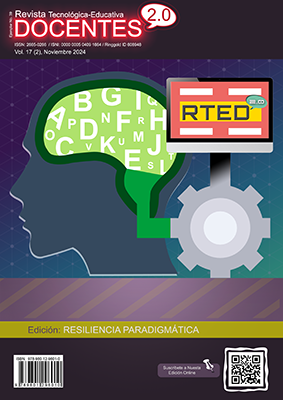The Implementation of Technology for the Teaching-Learning Process
 DOI:
https://doi.org/10.37843/rted.v17i2.565
DOI:
https://doi.org/10.37843/rted.v17i2.565
Main Article Content
Abstract
Today, technology has revolutionized both teaching and learning. Therefore, integrating technological tools into education has generated new opportunities and challenges. The objective was to examine the implementation of technology in the teaching-learning context by analyzing benefits, obstacles, and effective strategies to maximize its impact. The research was based on the systematic method, constructivist paradigm, and qualitative approach, with a biographical narrative design and exploratory documentary type. The study focused on the university educational environment, evaluating the impact of technology in this context. The sample included various bibliographic sources reviewed to obtain a comprehensive view of the importance of technology in education and the role of the teacher in its implementation. Meta-analysis techniques were used to collect and analyze the information. The results showed that technology was adapted to students' individual needs, promoted global collaboration, and enriched the educational process. However, obstacles such as the digital divide and the need to guarantee online security and privacy were identified. The conclusions highlighted the importance of ongoing teacher training and assessment to make the most of the digital transformation in education.
Downloads
Metrics
Article Details

This work is licensed under a Creative Commons Attribution-NonCommercial-NoDerivatives 4.0 International License.
Those authors who have publications in our journal accept the following terms:
- When a work is accepted for publication, the author retains rights of reproduction, distribution of his/her article for exploitation in all countries of the world in the format provided by our magazine and any other magnetic medium, optical, and digital.
- Authors will retain their copyright and guarantee the journal the right first to publish their work, which will be simultaneously subject to the Creative Commons Acknowledgment License (Attribution-NonCommercial-NoDerivatives 4.0 International (CC BY-NC-ND 4.0)). That allows third parties to copy and redistribute the material in any medium or format, under the following conditions: Acknowledgment - You must properly acknowledge authorship, provide a link to the license, and indicate if any changes have been made. You may do so in any reasonable way, but not in a way that suggests you have the licensor's endorsement or receive it for your use. NonCommercial - You may not use the material for a commercial purpose. NoDerivatives - If you remix, transform, or build from the material, you cannot broadcast the modified material. There are no additional restrictions - You cannot apply legal terms or technological measures that legally restrict you from doing what the license allows.
- Authors may adopt other non-exclusive license agreements to distribute the published version of the work (e.g., deposit it in an institutional archive or publish it in a monographic volume) provided that the initial publication in this journal is indicated.
- Authors are allowed and recommended to disseminate their work through the Internet (e.g., in institutional telematic archives, repositories, libraries, or their website), producing exciting exchanges and increasing the published work's citations.
- Request of withdrawal an article has to be done in writing by the author to the Editor, becoming effective after a written response from the Editor. For this purpose, the author or authors will send correspondence via e-mail: [email protected].
- The author will not receive financial compensation for the publication of his work.
- All Docentes 2.0 Journal publications are under the Open Journal System (OJS) platform at: https://ojs.docentes20.com/.
References
Adams, S., Brown, M., Dahlstrom, E., Davis, A., DePaul, K., Díaz, V., & Pomerantz, J. (2018). CMN Horizon Report 2018 Higher Education. Edition. Educause. https://n9.cl/k270rd
Alcántara, L., Artajona, L., Hernando, M., & Urraco, M. (2021). Diseño de estudio de caso: el uso de dispositivos tecnológicos en el Colegio Vivaldi de Alcalá de Henares. Tecnología, Ciencia y Educación, (18), 141-165. https://n9.cl/5ndz47 DOI: https://doi.org/10.51302/tce.2021.577
Andrade, J., Oña, R., Sánchez, E., & Toaquiza, J. (2021). Desafíos de la incorporación de las Tecnologías de la Información y la Comunicación (TIC´s) en el proceso de enseñanza – aprendizaje de la Educación Superior Universitaria. Ciencias de la Educación, 7(4), 1634-1652. doi: 10.23857/dc.v6i3.1383
Bagur, S., Rosselló, M., & Paz, B. (2021). El enfoque integrador de la metodología mixta en la investigación educativa. Relive. Revista Electrónica de Investigación y Evaluación Educativa, 27(1), 1-21. https://doi.org/10.30827/relieve.v27i1.21053 DOI: https://doi.org/10.30827/relieve.v27i1.21053
Banco Interamericano de Desarrollo (BID). (2020). La educación en tiempos del coronavirus: los sistemas educativos de América Latina y el Caribe ante COVID-19. https://n9.cl/bjzsa
Blog rockcontent. (2019). Tecnología en la educación: recursos innovadores para mejorar la calidad educativa. https://n9.cl/rf63c
Campos Retana, R. (2021). Modelos de integración de la tecnología en la educación de personas que desempeñan funciones ejecutivas y de dirección: el TPACK y el SAMR. Revista Actualidades Investigativas en Educación, 21(1), 1-27. doi:10.15517/aie.v21i1.42411 DOI: https://doi.org/10.15517/aie.v21i1.42411
Carvalho, L. (2024). Nuevas tecnologías en la educación: influencia, ventajas y desafíos. https://n9.cl/e9sod
Cruz, J., & Guzmán, T. (2021). Revisión sistemática sobre la realidad aumentada en la educación superior. Academia Journals Exploratoris: Revista de la Realidad Global, 10(1), 17-23. https://n9.cl/ma0qb0
Cubero, M. (2023). ¿Cómo integrar efectivamente la tecnología en la educación? https://n9.cl/6lgp3
Educo. (2020). El impacto de las nuevas tecnologías en la educación. https://n9.cl/uf7kd
Granados, M., Romero, S., Rengifo, R., & García, G. (2020). Tecnología en el proceso educativo: nuevos escenarios. Revista Venezolana de Gerencia, 25(92), 1809-1823. https://n9.cl/4g33g
Hernández Sampieri, R. (2006). Metodología de la investigación. (4a ed.). McGraw-Hill.
Mariaca, M., Zagalaz, M., Campoy, T., & González, C. (2022). Revisión bibliográfica sobre el uso de las tic en la educación. Revista Internacional de Investigación el Ciencias Sociales, 18(1), 23-40. https://doi.org/10.18004/riics.2022.junio.23 DOI: https://doi.org/10.18004/riics.2022.junio.23
Ordóñez, J. (2023). El Open Access: Un medio para la democratización del conocimiento. Revista de la educación superior, 52(205), 85-102. https://doi.org/10.36857/resu.2023.205.2371
Organización de Estados Iberoamericanos (OEI). (2021). Los desafíos de las TIC para el cambio educativo. https://n9.cl/978t1
Sampaolessi, L. (2021). Las TICs en la Educación: Impacto y Situación Actual en Escuelas Latinoamericanas. https://n9.cl/bdaqu
Vygotsky, L. (1981). El desarrollo de los procesos psicológicos superiores. Grijalbo.






